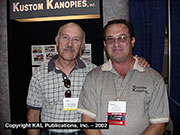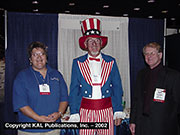
October 2002 Issue Highlights
For more complete coverage, send us an e-mail to
request a back issue.

For more complete coverage, send us an e-mail to
request a back issue.

Colorado Wyoming Petroleum Marketers Association Convention

Western Carwash Association Convention & Tradeshow
Want to see the photos that didn't make the issue? Check out
the Cutting Room
Floor.
Phillips,
Conoco Complete Merger, Create Third Largest U.S. Oil
Company
L.A. Schools Ban Soft Drink
Sales
Hawaii Tanks Go
Uninspected
Beaverton Bans Self-Service
Cigarettes
ChevronTexaco to Keep
Texaco Brand Alive
Washington C-Stores Raided by
DEA for Cold Tablets
PHILLIPS, CONOCO COMPLETE MERGER, CREATE THIRD LARGEST U.S. OIL COMPANY
HOUSTON, TX. — After several months of delay waiting for Federal Trade Commission approval, Phillips and Conoco have closed their merger deal.
ConocoPhillips, created at the beginning of September with a $15.2 billion stock merger, created the sixth largest publicly held oil and gas company in the world and the third largest in the United States (after ExxonMobil and ChevronTexaco).
ConocoPhillips will be the largest refiner in the United States, surpassing ExxonMobil, with a capacity of approximately 2.1 million barrels per day.
The combined company will also operate 20,000 gasoline stations with approximately 17,400 of the sites located in the United States.
At this stage in the merger there are no plans to eliminate one of the brands, according to Conoco Chairman and CEO Archie Dunham, but stations may be rebranded in individual markets. "We’ll take advantage of the Conoco brand where it’s the strongest brand," said Dunham. "We’ll use the Phillips brand where it’s the strongest."
ConocoPhillips also owns the Union 76, Circle K, and Kendall brands; their future has not been announced at this time.
To gain the FTC’s approval, Phillips agreed to sell its 25,000 barrel-per-day refinery in Woods Cross, UT., and its light petroleum products terminal in Spokane, WA. Conoco agreed to sell its 60,000 bpd refinery in Commerce City, CO. Both companies also agreed to divest service stations and other wholesale assets in the Rocky Mountain territory to avoid any potential anti-trust problems.
The new company will be based in Houston, TX., in Conoco’s former headquarters with Phillips Chairman and CEO James Mulva serving as the first CEO of ConocoPhillips. Dunham will serve as ConocoPhillips Chairman until October 2004 when he will retire.
L.A. SCHOOLS BAN SOFT DRINK SALESLOS ANGELES, CA. — The Los Angeles School Board has voted to ban soft drink sales during school hours, claiming that the ban will promote better health in students.
The soft drink ban is the latest action in a growing trend where government agencies are looking to restrict food and drink that is sold. The agencies say they are taking action because people don’t understand that what they’re eating and drinking is causing health problems and obesity.
Under the terms of the ban, the 677 schools in the L.A. Unified School District will be prohibited from selling carbonated drinks during school hours, effective as of January 2004.
Water, milk, drinks containing at least 50% fruit juice, and sports drinks with less than 42 grams of sugar per 20 ounce serving will still be allowed.
"We are being singled out for a very complex problem," said Sean McBride, the spokesman for the National Soft Drink Association. He argued that the school district should be spending its time educating students about nutrition issues instead of simply banning sodas.
McBride added, "The one thing you simply cannot ignore in this is the role of a sedentary lifestyle. This is about the couch, not about the can."
While the school board was enthusiastic about the ban, many school administrators were not. Soft drink sales provide supplemental funds for a variety of school programs and school principals and administrators are unsure where those monies will come from once the ban is in place. Alex Contreras, the assistant principal of Los Angeles High School, explained that in the past Coca-Cola has paid the school $50,000 for a three-year exclusive contract. In addition, the school earns approximately $5,000 monthly from soft drink sales. This revenue is used to fund items such as sports referees, dance supervisors, and field trips.
"You can only sell so many candy bars and have so many magazine drives," said Contreras. "Honestly, some of those programs will be hurt very badly and I don’t know what alternative we will have."
School Board President Caprice Young said that the phase-in of the soda phase-out would give the schools opportunities to find additional funding sources. "We need to make sure the kids are drinking things that are not unhealthy for them," said Young, "and, at the same time, balancing the need to have revenue for our clubs and sports. I think we’ll be able to do that."
Responding to the news report, the National Association of Convenience Stores noted that "The questions that retailers will have to answer is how aggressively they wish to step into this marketing chasm. Clearly, there is the opportunity to take advantage of the vote to market soft drinks specifically to students, but there will have to be some sensitivity to how seriously parents take the ban."
"It’s going to set a national trend," predicted Francesca de la Rosa of Occidental College’s Center for Food and Justice. "People will say if you can do it at LAUSD, you can do it anywhere."
HAWAII TANKS GO UNINSPECTEDHONOLULU, HI. — Hawaii’s underground storage tanks may not be inspected in a timely manner due to a shortage of staff in the state’s Health Department, the organization charged with monitoring USTs.
The Hawaii legislature passed a law in May 2000 requiring that all of the state’s USTs be inspected to make sure they were in compliance with state regulations. Hawaii’s UST regulations are more stringent than the federal UST regulations.
The law also requires that the tank inspections be completed by the end of 2004.
Since that time, health officials have inspected 318 sites in the state. However, there are 1,101 regulated UST sites housing 2,134 USTs in Hawaii and state officials say they will be unable to meet the 2004 deadline.
"It is, and has been, a large problem," said Gary Gill, Hawaii deputy health director for the environment. "I don’t know if we can sustain the level of inspections with our current staffing shortages."
Hawaiian officials say of the 318 sites that have been inspected, they have issued 110 citations for violations totaling $85,000 in fines. The largest state fine was $10,500 was levied against Center Petroleum in September 2000 for an equipment failure at a Nawiliwili, Kauai gasoline station; that fine was later reduced to $4,500 when it was discovered the problem stemmed from a piping problem.
BEAVERTON BANS SELF-SERVICE CIGARETTESBEAVERTON, OR. — The City of Beaverton has passed a regulation that bans both self-service cigarette sales and the sales of cigarettes in amounts less than a pack of 20.
Under the new City Council regulation, which took affect in August, Beaverton tobacco retailers must market their cigarettes from behind a counter or a locked enclosure available only to employees.
Businesses that do not allow minors access including tobacco-only stores, bars, and casinos, are exempted from the regulation.
Fines of up the $300 may be imposed for retailers not in compliance.
SAN FRANCISCO, CA. — ChevronTexaco has announced that it will not only keep the Texaco brand but it will market fuel under the Texaco flag beginning in 2004.
"Chevron and Texaco are both premium quality brands and together will position our company as a premier marketer of gasoline and lubricant products in the United States," said ChevronTexaco North America President Dave Reeves.
This move is a departure for ChevronTexaco which had told marketers it would be utilizing only the Chevron brand for its gasoline marketing in the United States.
Meanwhile, Shell had acquired the Texaco stations that had been part of the Equilon and Equiva partnerships. Shell continues to have the right to use the Texaco brand until June 30, 2004.
Many Texaco-branded dealers and distributors wanted to keep the Texaco brand and were dragging their feet as they looked at the options.
"I’ve had the Texaco brand for over 30 years," said one dealer. "I don’t want to be Shell and I don’t want to be Chevron. Texaco is a recognized brand and the customers like it. I should be able to keep it."
With the new announcement from ChevronTexaco, it looks as if those wishing to keep the Texaco brand may be able to do so.
"I’m planning to keep the Texaco brand," said a distributor, "but the next two years may be pretty tough. Will Shell supply me? Will ChevronTexaco? Will I be a second-class citizen until 2004? It’s too soon to tell."
Shell officials stated that they will supply Texaco jobbers through 2006, fulfilling the terms of their current agreements but did not say if they will give priority to their Shell-branded distributors.
In recent months, Shell has been focusing their efforts on converting their existing Texaco stations to the Shell brand and says they will continue to do so. The company said that they will invest $500 million in the next year and a half to convert stations to Shell as well as spend another $25 million in advertising and support for its brand.
Shell says it plans to rebrand approximately 90% of the 13,000 Texaco stations it acquired as part of the deal with ChevronTexaco and close the remaining 10%.
Shell says it has been equally effective in converting Texaco jobbers to the Shell brand. The company said that among the marketers it "identified as important" the majority had already committed to sell Shell products.
Shell also noted that it has the exclusive rights to the Texaco brand through June 2004 — no one can open a new Texaco station in that time period without their approval.
WASHINGTON C-STORES RAIDED BY DEA FOR COLD TABLETSSPOKANE, WA. — Nine independent convenience stores here were raided by the Drug Enforcement Agency on suspicion that they were illegally selling cold tablets that contained the ingredient pseudophedrine.
Once common in cold tablets, pseudophedrine has been banned because it is the active and prime ingredient in methamphetamine. When the DEA discovered that methamphetamine suppliers were using cold tablets to manufacture the drug, they banned the sale of any product using pseudophedrine.
Undercover officers were reportedly able to buy 144 packages of the cold tablets with the illegal ingredient between the nine stores.
Originally published in the October 2002 issue
of O&A Marketing News.
Copyright 2002 by KAL Publications Inc.
Serving the 13 Western States, the World's Largest Gasoline, Oil, Fuel, TBA and Automotive Service Market